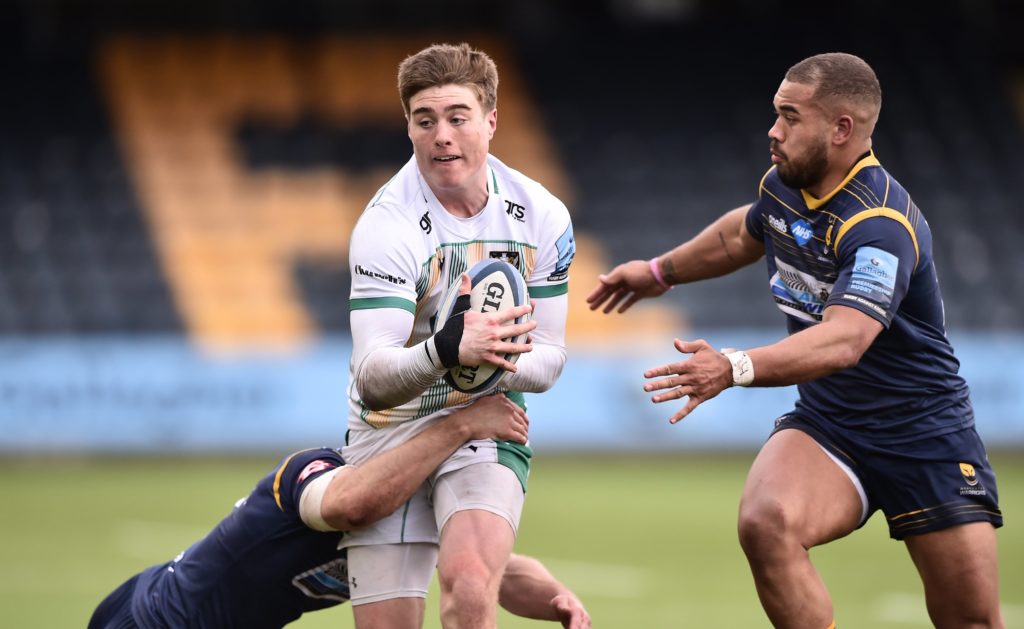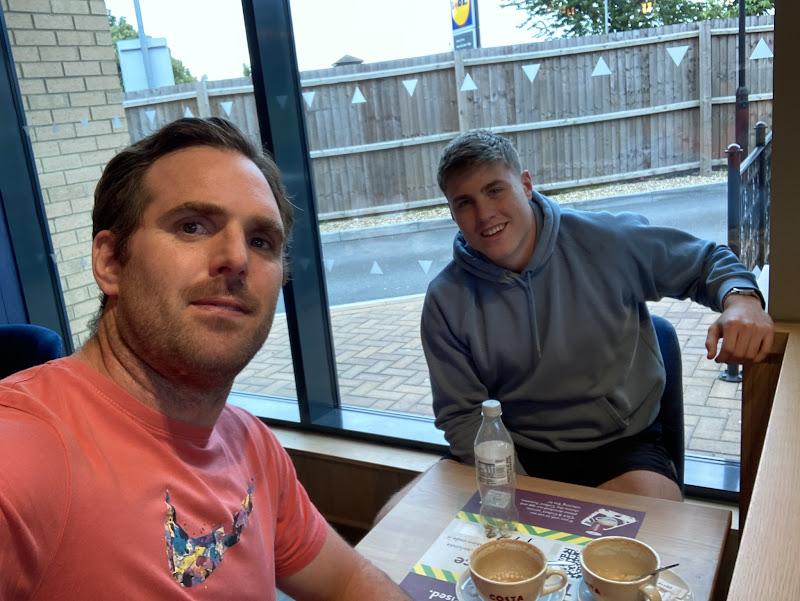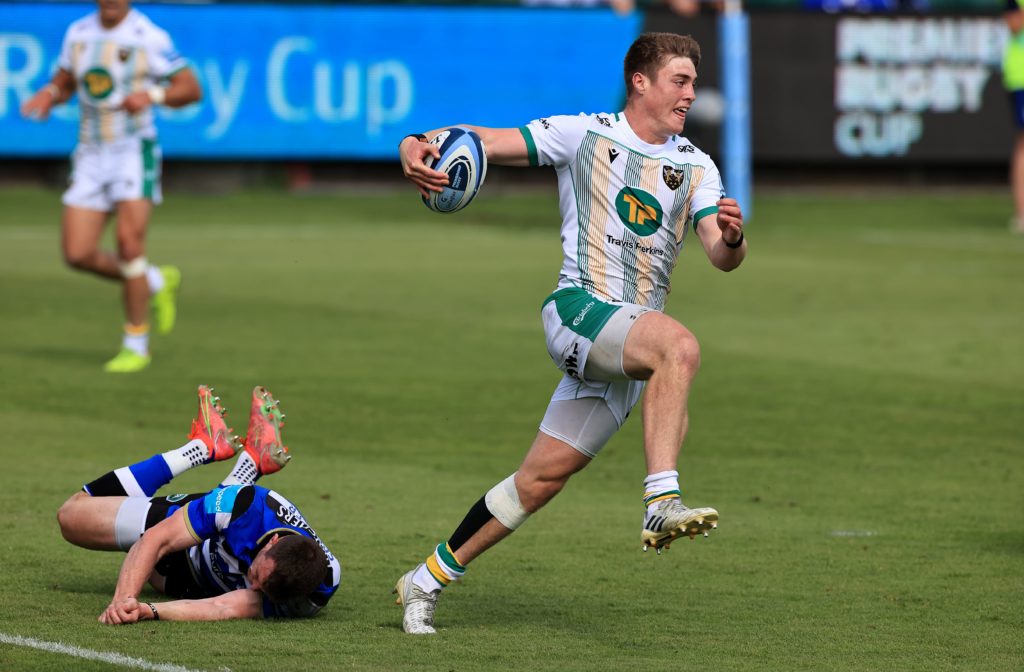September 2011: Saints TV catches up pitchside with Jon Clarke. The Northampton centre is being quizzed post-match after a 26-13 defeat at The Stoop by Harlequins. The interview remains on YouTube, you can still watch it. About 25 seconds in, a young lad of around 10 years old appears in shot, over Clarke’s shoulder. The boy has already spotted the camera and saunters into view, keen to get on tape. He is giddy with excitement and continues to talk to a friend, who is out of shot, but then, having summoned the courage, decides to turn to the camera and smile. The smile turns into a gurn. He bounces up and down to ensure he can be seen. He has stolen focus and is loving his moment in the sun. Clarke continues to lament, unaware of how he is being upstaged; the match still heavy in his lungs, the valiant loss still visible across his face. That young lad is Tommy Freeman. The man whose limelight he is stealing will, serendipitously, end up playing a pivotal role in Freeman’s own burgeoning Premiership rugby career at Northampton Saints. Funny how things end up playing out.
Freeman talks to me from his home, fresh from a return from Sweden where he has endured a small operation. A “clean-up” he calls it, nothing too serious. The same smile from the YouTube clip is evident. His 2020-21 season with Northampton has resulted in him awarded the ‘Breakthrough Player of the Year’ by the club. There is plenty to be giddy about.
Behind the smile lies disappointment, resilience and a fair amount of determination. His story should be told to any young player with serious aspirations of reaching the top level.
That said, Freeman’s rugby journey has not been straightforward. Behind the smile lies disappointment, resilience and a fair amount of determination. His story should be told to any young player with serious aspirations of reaching the top level. There are also lessons evident for the game as a whole. How flawed the academy system can be; how subjective, how liable to miss those who grow late into the sport.
But let’s go back to the beginning. The youngest of three brothers, Freeman was born into an RAF family. One that sprawled itself across East Anglia and had a couple of parents prepared to do almost anything for their sons. We talk about different schools and provisions for three different brothers; how down to earth and supportive his parents were; how Tommy had to choose between hockey and rugby, how busy his weeks were. He reveals a story about parents who drove thousands of miles a year to get him where he needed to be and a mum who led, and still leads, the charge on his rugby.
“To this day, I have to have a debrief with her,” says Freeman. “With my Saints games, she watches them live, watches them again on record and then listens to Graham and Lenny on the radio (BBC Northants). She talks to me, ‘Why did you do that? Why didn’t you do this?’ and I’ll be like, ‘Mum, relax…’”
He was a very gifted sportsman, one who enjoyed football at an early age with his Cornish dad. But Culford School in Bury St Edmunds played rugby and by 12 he was already being shaped for great things. By 14, he was swept up into the Leicester Tigers academy system and all was going well. His weeks were spent playing for school, two different clubs and representational sides. His mum and dad clocking up the motorway miles as they ferried him around; academia was playing second fiddle to a life of muddy boots and water bottles.

But at 16, while at school, Freeman received an email, saying he wasn’t needed any more at Leicester; he was being cut from their academy programme. A devastating hammer blow to a young career.
“I remember opening it and just seeing this list of names – and mine not being on it. It was a huge group, three or four big groups across the region, being cut down. Initially, I was OK with it but then other people’s reaction to it made it feel like it was a big thing, like it was the end of a road. That was pretty tough. I knew deep down that it wasn’t the end but any rejection is difficult to deal with. I knew that skill-wise, knowledge-wise, I still was good enough. It was my size and my speed; I hadn’t quite grown like others, I was not as physically well developed at 16. It was disappointing and I was upset but I never gave up. I just knew I had to go a different way.”
It comes down to subjectivity and we can get it wrong. I would question if one set of eyes works. That whole system leans towards big schools and big boys. A lot can happen between 16 and 18, 19. We need a way to try to catch the boys who fall out.
Jon Clarke
This is a point I bring up in conversation with the aforementioned Clarke. The former Saints, Worcester and Leeds centre is now involved with coaching young players and spotting talent. Can we miss certain players with a big cull at 16?
“Without doubt,” his Yorkshire tones tumble down the phone line, as uncompromising as ever. “It comes down to subjectivity and we can get it wrong. I would question if one set of eyes works. That whole system leans towards big schools and big boys. A lot can happen between 16 and 18, 19. We need a way to try to catch the boys who fall out.”
Freeman fell out. And his different way was to move schools. Not an easy upheaval but one that he was willing to make. He would have to work hard, to start again. But maybe a different view, in a different catchment area, would do the trick. This was when Clarke and Freeman reunited. Clarke spent time watching Moulton College’s games and then started coaching Freeman.
“He was just a fantastic kid,” says Clarke. “His attitude stood out a mile. He would listen and learn really well. He’d do what you told him. He filters information and his game play is excellent. I am not surprised someone like Sam Vesty has got the best out of him. From day one I was like, ‘This kid has got something, he needs to get along to Saints’. I didn’t really know what had happened to him at Leicester, I could just see he had focus. And he was working hard on his speed and his power: things came together. It’s funny to think of the kid behind me on that YouTube clip. I met up with him last week, had a coffee, he finally bought a round! It was good to check in with him and see how things were going. Zero Quins chat though!”

“I was not a Quins supporter!” counters the 20-year-old Freeman. “The Stoop was where my Dad and I went to watch our games of rugby. I can’t believe Clarkey is still bringing that up!”
This past season has seen Freeman become a regular starter at Franklin’s Gardens at both full-back and wing. His swashbuckling style has quickly made him a popular pick. The way he reads the game and uses his brain to calculate the options has impressed Chris Boyd; time again he has found himself in the right place at the right time, often over the tryline. I ask if he traces this current success back to his move to Moulton College.
“I moved to prove to myself that I could do it. From 12 years old through to about 15 I was confident about my rugby. But at 16, with others getting bigger and stronger, I definitely felt my self-belief dip” says Freeman. “I was not good at tackling, so that affected how I felt. Maybe the Leicester set-up knocked me too.
“I remember being about 14 at a camp at Bishop Burton up north, we were doing this tackling drill and one of the coaches was screaming all sorts at us, like we were in the military, and I was thinking ‘What is going on?’ Obviously, there were people who could cope with that but I would happily say that I am not an overly aggressive person and that pushed me away rather than drew me in. I didn’t move to Moulton thinking, ‘This is how I get into the Saints set-up’. I just wanted to prove to myself that I could play as well as I could again. I didn’t have a future in mind, I just wanted to enjoy playing rugby. And that is why someone like Clarkey is so important. He didn’t see size or power, he saw skill.”
Tommy loved competition. That was perhaps his greatest attribute. We’d do handling drills and he’d hate it if he wasn’t the best and would just go again and again until he was.
Phil Powell
“I see a lot of Tommys coming through every year,” says Phil Powell, Head of Rugby at Moulton College and Midlands Under-18s head coach. “And the call from the selectors is always the same, ‘Not big enough’. Skill is something that gets overshadowed. There’s a big disparity at age-group level, the difference between 16 and 18 is huge. And there is a bias towards public schools. They produce that sort of big powerful player a lot; their resources allow them to train and develop players from a much earlier age and they end up coming out bigger and stronger: skilful players get passed over.”

“I’m not against the rejection. In fact, for someone like Tommy, getting cut like he did probably helped him, but it is how we look after the players once they get cut. The aftercare and support is not always there. They get told they aren’t good enough and that’s that. How many does this sport lose?”
“Tommy loved competition. That was perhaps his greatest attribute. We’d do handling drills and he’d hate it if he wasn’t the best and would just go again and again until he was. He trains incredibly well; I remember Clarkey saying that to me; that was why he took him along to Saints. But I do sometimes wonder what would have happened if Jon hadn’t got involved. Tommy may have ended up going in a different direction and Saints wouldn’t have got him as they did. A bit like that video of them at that Quins game all those years ago, Tommy making faces into the camera: it is all a bit lucky.”
Freeman will bound into next season, looking to go higher and further, part of a special Northampton Saints squad all searching for that bit of luck. But as we know, being lucky is only part of it. It’s what you do with that luck that counts.
More stories from Sam Roberts
If you’ve enjoyed this article, please share it with friends or on social media. We rely solely on new subscribers to fund high-quality journalism and appreciate you sharing this so we can continue to grow, produce more quality content and support our writers.


Comments
Join free and tell us what you really think!
Sign up for free